Reflections in a Golden Eye (1967)
“Any fulfillment obtained at the expense of normality is wrong, and should not be allowed to bring happiness.”
|
Synopsis: |
|
Genres, Themes, Actors, and Directors:
Review: Underlying the entire film are two primary strengths: first is its unique look, as specifically envisioned by Huston, who (working with DP Aldo Tonti) had the color strategically desaturated from the film stock in an attempt to emulate the story’s titular perspective. While the film was only allowed to run in theaters for a week with this color scheme (before saturation was added back in to make it more palatable to mass audiences), the restored version is now available, and is quite a visual treat. Second, it features a truly heartbreaking and noteworthy performance by Brando, embodying a tragically repressed army major who has clearly maintained a facade of “normalcy” and rigor for far too long. Brando’s every expression reveals the depth of his character’s confusion, anger, and desire, and he’s consistently fascinating to watch. Meanwhile, the supporting actors all do fine work in their respective roles. Both Taylor and Harris are well-cast as Brando and Keith’s unhappily married wives, who find solace through radically different venues; Keith once again demonstrates his capability as the ultimate “everyman” with a surprising depth of heart; and unknown actor Zorro Davis makes an indelible mark as the flamboyantly “artistic” Filipino manservant Anacleto. In his screen debut, Forster isn’t called upon to do much more than brood, sniff lingerie, and ride naked on horseback, but he suits the role. Together, the ensemble presents a powerful if at times mind-boggling drama about (sexual) identity and one’s place in a world which would much rather not accommodate square pegs in round holes. Note: There was once a rather active message board for this film on IMDb, where one poster offered this interesting perspective on the various characters and their sexual identities:
This breakdown, while perhaps overly simplistic, does give one additional food for thought. Redeeming Qualities and Moments:
Must See? Categories
Links: |
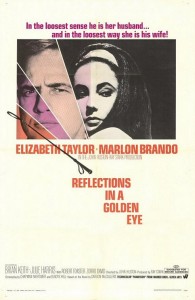
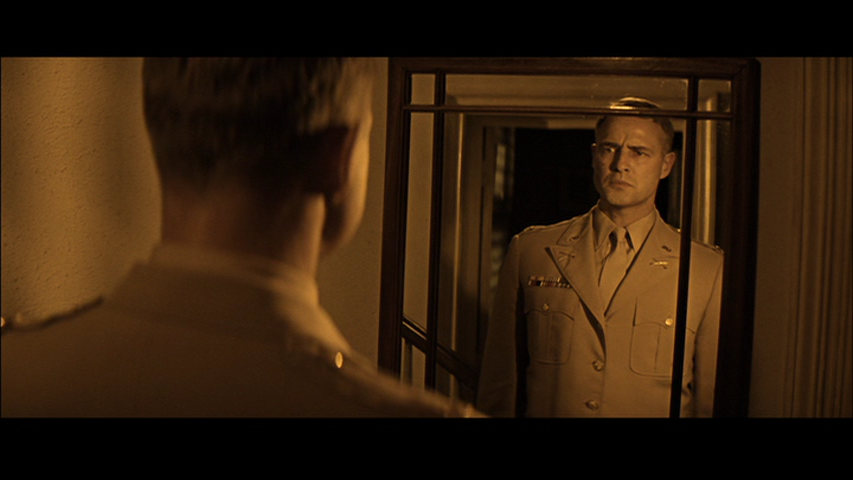
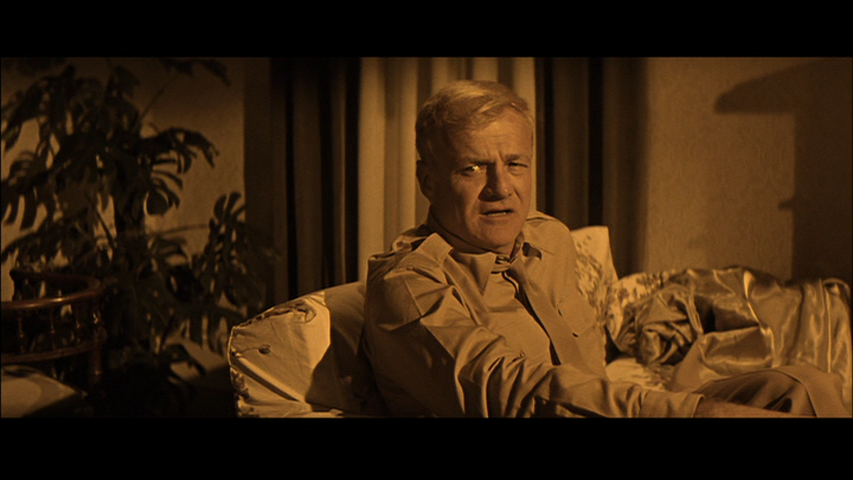
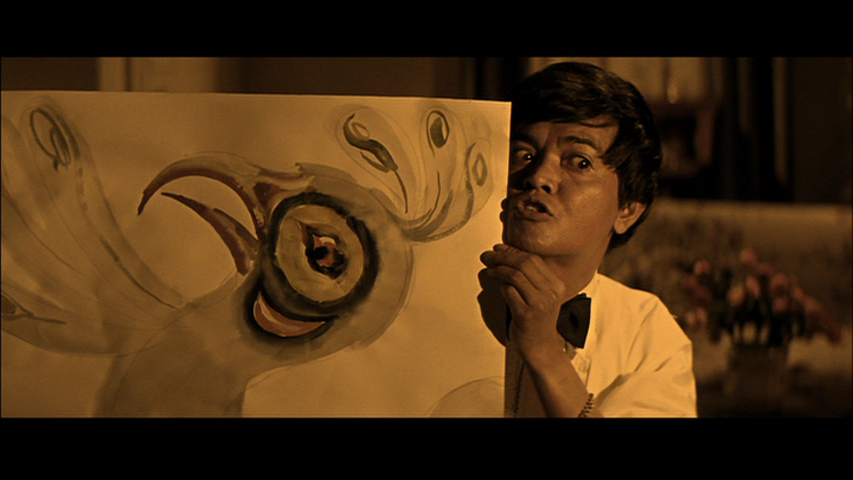
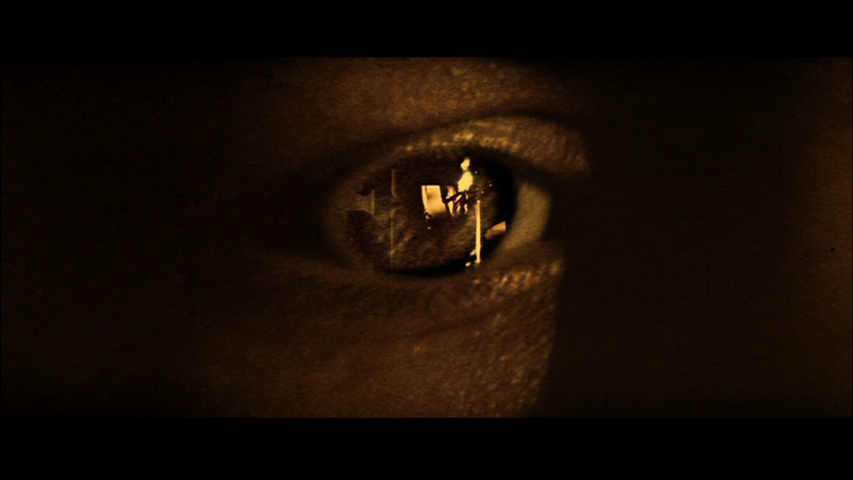
3 thoughts on “Reflections in a Golden Eye (1967)”
Must-see, as a unique cinema experience (referring to Huston’s original vision of the film as well as its storyline) and for the direction and spot-on performances (esp. Brando). A personal recommendation for gay ffs as well.
As most realize, growing up gay in the ’60s was a far cry from growing up gay now. Even though I grew up in the ’60s and the latter part of that decade opened up freedom of sexual expression and acceptance of identity, those of us who were young and gay were still at a disadvantage in terms of role models. (My personal belief is that gay people remain all too lacking in that regard.) What we were reading and seeing on film about gay people was still mainly filled with deep-rooted angst. (Even a breakthrough play/film like ‘Boys in the Band’ was very much a product of ’50s paranoia and self-loathing.)
I read McCullers’ striking novella when I was in high school – along with everything else McCullers wrote. Others who have done the same thing no doubt were immediately taken with the fact that ‘Reflections…’ is in a number ways the polar opposite of her memorable and much more accessible first novel, ‘The Heart is a Lonely Hunter’. But I find myself refraining from referring to ‘Reflections…’ as a melodramatic work – to me, that would imply a certain, heightened exaggeration which I don’t think the work contains. I remember being immediately pulled in by the book’s opening line: “An army post in peacetime is a dull place.” That implied subconsciously to me that at least some of the characters I was about to meet would be bored, left to their own devices emotionally. One in particular – Major Penderton – would be seen to snap. As a gay teen, I didn’t relate to Penderton at all; I was not all that repressed growing up. But, for me, that character quickly fell in line with the many other gay characters in literature and film which I sensed a) I did not need to ever be like in any way, and b) I was to always remember as part of my ‘personal’ history.
When I first saw this film, I was unaware that Huston’s haunting, hypnotic, ‘golden’ vision for it had been placed in a vault and a colorized version was the only one available. Needless to say, it was an astounding discovery for me when I eventually knew of its existence. It’s an amazing, one-of-a-kind approach to filmmaking – taking a novel’s title so literally that it governs the film completely and, as it turns out, in such a fitting manner. This was not the first time Huston experimented in such a visual manner: he had done something along similar lines when he directed ‘Moulin Rouge’ – and studio heads balked over Huston’s ‘muddy’ use of color. Still, ‘MR’ *was* still in color; ‘Reflections…’ was originally given a look so ‘anti-audience’ (or so it seemed) that the original print was buried. Audiences today are much more open to such visual experimentation – which shows us that the film, as conceived, was simply ahead of its time.
As for the film’s content…it has the layers of an artichoke. No character grows or develops in this story; on the whole, these are people stunted by circumstance who are left chasing their tails. Denial reigns. Souls implode. ‘Reflections…’ is an emotional horror story. And at its forefront is Brando giving one of the best performances of his career. Montgomery Clift was slated for the role, but I don’t honestly know how he could have pulled it off as effectively as Brando – whose intricately detailed understanding of the part is nothing short of genius. Particularly powerful is the riveting sequence in which Brando passive-aggressively borrows Taylor’s beloved horse. What happens then comes with startling camerawork – and the closing of that sequence (which judiciously saves the viewer from witnessing any real harm to the horse) reveals Brando all but literally naked in raw emotion.
Huston has remarked that a good deal of a director’s job is done for him if he casts properly. That could be a modest statement – Huston has always seemed an actor’s director, since he consistently gets rich, satisfying work out of his cast (and often from people who particularly shine under his guidance; Mike Nichols has often managed something similar). ‘Reflections…’ seems cast with actors born to play these roles – from top star down, you sense that the actors *are* these people.
I would not hesitate in calling this film a ‘masterpiece’ – one which adventurous ffs (and can one be a real ff and *not* be adventurous?) must not miss. It’s one that I watch about once a year – and find myself, without fail, captivated each time.
Note: although the film has a somewhat (appropriately) somber feel overall, it is not completely without humor – as witness the scene in which Brando happens upon Taylor with the maid in the kitchen. He overhears Taylor in the midst of telling the maid a joke: “So these two little queers went into this bar…and this great big old barman was looking at them for a long time. Finally he said, ‘Are you two sisters?’ And they said, ‘Hell, no, we’re not even Catholic!'”
Sidebar: In the story, the ‘golden eye’ in Anacleto’s drawing belongs to a peacock. There is a marvelous recent film (in its own way, very much a cult item like ‘Reflections…’) called ‘Peacock’. It takes place in Nebraska, which has no town named ‘Peacock’. However, the film shares a marked eccentricity with ‘Reflections…’ and I wonder if the those responsible for ‘Peacock’ have paid indirect homage to Huston’s film. Hmm…
When I reflect back on this film several months after my first viewing, it remains potent. I find myself wanting to revisit just about every scene with Brando, and continuing to wonder about Zorro David’s performance.
Meaningful/non-stereotypical performances by people of color in the era of “classic Hollywood” (nebulously defined, but let’s say from cinema’s inception until 1970 or so) remain especially of interest to me, as I wonder how audience members within these ethnic groups perceived their “representations” on screen. I wonder — would David’s Anacleto feel demeaning/stereotypical? Or would said audience members feel grateful for at least some expansion of character, in a role (Asian man-servant) that would typically be limited to comedic relief and/or merely social “wallpaper”?
To me it’s a question of the degree to which Asians have assimilated into American culture, as opposed to being ‘under-represented’ or ‘represented unfairly’ in films not essentially about Asians.
As a result, I see Anacleto as an individual homosexual man, and not at all representative of his culture, per se.